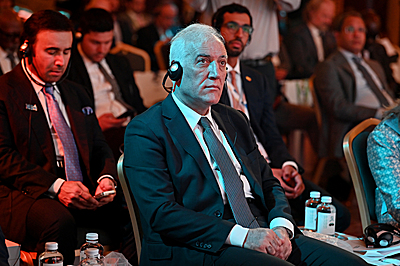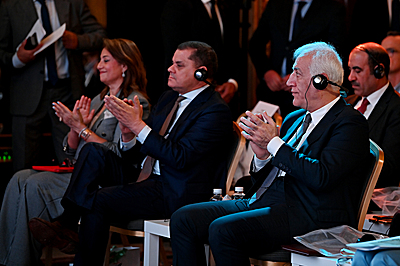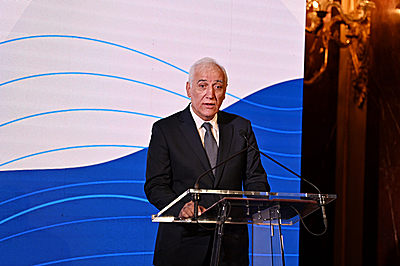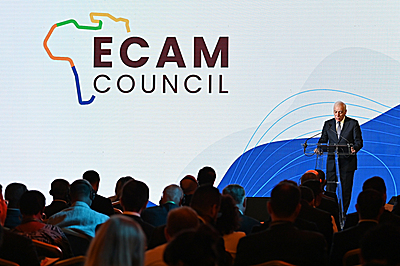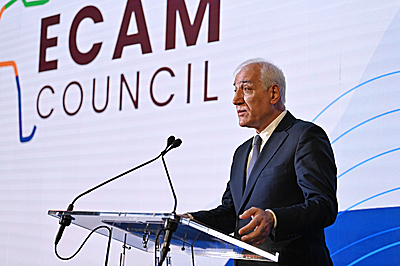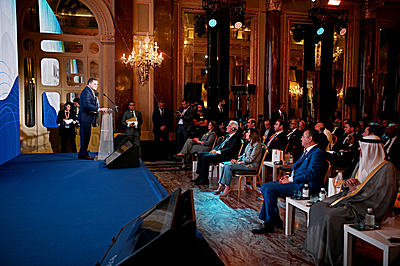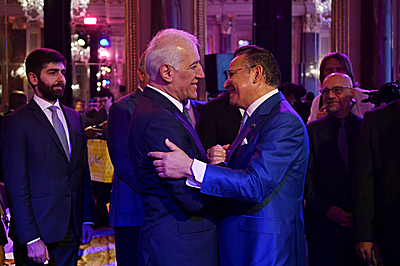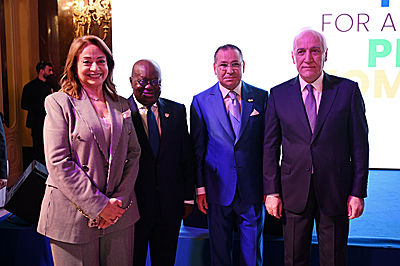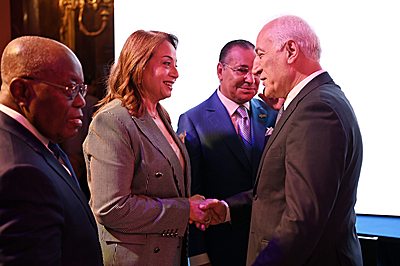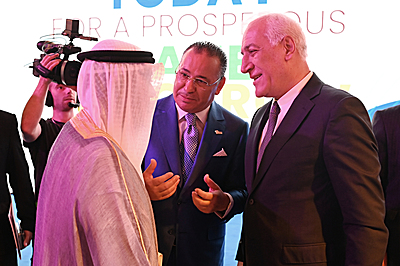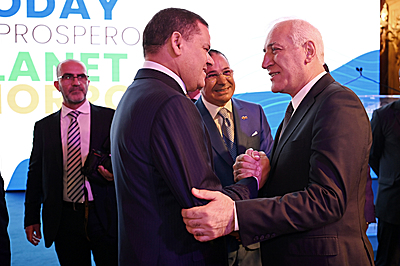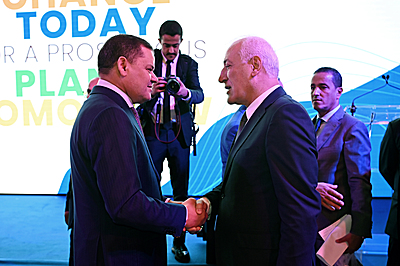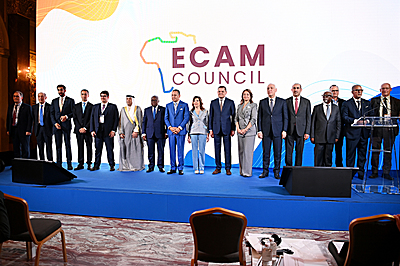Press releases
President Vahagn Khachaturyan delivered a speech at the summit of the European Corporate Council of Africa and the Middle East
As part of his working visit to the Republic of Italy, the President of the Republic of Armenia Vahagn Khachaturyan attended the summit of the European Corporate Council of Africa and the Middle East (ECAM Council).
ECAM's annual multilateral summit aims to bring together the leaders from various political and professional fields for constructive analysis, exchange of ideas and pathways to address various challenges. The summit was organized in collaboration with the Ambrosetti think tank in Italy as part of the UN Food and Agriculture Organization event.
Armenian President Vahagn Khachaturyan delivered a speech within the framework of the summit.
“At the outset, let me express my gratitude to the European House – Ambrosetti, one of the most respected Think Tanks - for organizing today’s important and timely event, as well as for its mission in general - to promote constructive dialogue, new partnerships and strong cooperation between different regions.
Since its inception, the Forum has brought together Heads of State, Governments, cabinet members, Nobel laureates and business-people to discuss solutions to the most pressing challenges for the world’s sustainable development. And today, as President of Armenia, I am particularly pleased to be offered from this very podium to address the distinguished audience at this increasingly challenging for my country time.
As we gather here in Rome, I would like to briefly reflect upon the deep-rooted relations between Armenia and Italy. Our two nations have shared historical, cultural, and economic ties that have withstood the test of time. Italy has been a valuable partner to Armenia, and we cherish the bonds of friendship that exist between our countries.
Ladies and Gentlemen,
The title of today’s important event “Driving Change Today for a Prosperous Planet Tomorrow” and its very goal resonates with Armenia deeply. As you are aware, the Armenian nation currently continues to struggle for a just peace in our region, and the leadership of the country is genuinely committed to advancing this noble objective. Such a commitment is an ambitious yet necessary goal in these turbulent times for our region and the world.
While referring to food security sustainability, I would like to highlight that it is one of the most important security components of any society. It plays a decisive role in improving security and living standards of the population.
In the meantime, we must view today’s agenda in a wider context of the recent developments taking place in the world. My country is extremely sensitive to food security issues especially today when the Armenian population of Nagorno Karabakh is challenged with food shortages and hardships in their homeland. The humanitarian crisis in Nagorno Karabakh is deteriorating on daily basis. For almost 8 months the population is deprived of all kinds of goods supplies, resulting from the illegal blockade of the Lachin corridor by Azerbaijan. There is a real threat of ethnic cleansing of Armenians in Nagorno-Karabakh by Azerbaijan, and there is an urgent need to address the issues of fundamental rights and security of the 120,000 Armenian population of Nagorno Karabakh. Azerbaijan cut all means of food, medicine, electricity and gas supply to Nagorno-Karabakh. Despite numerous calls of international community and legally binding decisions of international organizations, including International Court of Justice, Azerbaijan continues to blockade Nagorno Karabakh, enjoying complete impunity.
Mr. Chairman,
Let me provide some data in order to vividly illustrate how the situation developed during the recent months:
• On February 22, the International Court of Justice issued a legally binding order against Azerbaijan to take all necessary measures to ensure unimpeded movement of persons, vehicles and cargo along the Lachin corridor in both directions.
• In stark contrast to this order, on April 23, Azerbaijan illegally installed a checkpoint on the Lachin corridor, claiming that hereby it implements the Order of the Court.
• On June 15, Azerbaijan went further with fully blocking the corridor by banning any access to Nagorno-Karabakh, even humanitarian, including of the International Committee of Red Cross.
• On July 6, the ICJ issued another order reconfirming its previous ruling and reaffirming Azerbaijan’s international legal obligation to take all necessary measures at its disposal to ensure unimpeded movement of persons, vehicles and cargo along the Lachin corridor in both directions and, therefore to immediately cease the operation of its checkpoint, as it unquestionably impedes the rights of Armenians living in Nagorno-Karabakh constituting a discrimination under the Convention on the Elimination of All Forms of Racial Discrimination.
Mr. Chairman,
From the humanitarian perspective, the most pressing are the energy and food security issues, as well as the disruption of the proper functioning of the healthcare system. I would like to present to you some facts and figures that will help to have a better understanding of the situation on the ground.
• Since January 9, 2023, Azerbaijan has disrupted the supply of electricity through the sole high-voltage line between Armenia and Nagorno Karabakh. There have been daily six-hour power outages, almost 50% decrease in electricity consumption, and depletion of local electricity production and supply systems.
• Starting from December 13, 2022, Azerbaijan periodically, and since March 21, almost continuously, has been interrupting the only gas supply from Armenia to Nagorno Karabakh, thereby deepening the energy and humanitarian crisis.
• Due to the diminishing availability of fuel and other essential resources and the full interruption of supplies from Armenia, almost all agricultural work, as well as the functioning of other sectors of the economy, has halted.
• Furthermore, the transport system is also paralyzed, with public transportation, including the inter-community one, to stop functioning in the coming days, while private transportation has come to a standstill long ago. Due to the acute lack of fuel, the internal public transportation of the capital city of Stepanakert functions only with 2 buses serving over 60,000 people.
In relation to today’s very subject of discussion - food security, let me underline, that:
• The suspension of all humanitarian supplies since June 15, coupled with the gradual utilization of limited domestic stocks, has resulted in an acute food shortage and closures of shops. Prior to the blockade, around 90% of all consumed food was imported from Armenia, and with every passing day the people of Nagorno-Karabakh don’t receive 400 tons of essential goods.
• Furthermore, by using force and the threat of force, Azerbaijan continues to obstruct agricultural activities on approximately 10,000 hectares of land adjacent to the contact line, which constitutes a significant portion of the total cultivated land.
• As a result, today the people of Nagorno-Karabakh are on the verge of hunger and starvation.
The illegal blockade resulted in violation of other fundamental rights of the people of Nagorno-Karabakh, including:
• The right to healthcare, as due to the lack of fuel, the work of the healthcare system is also affected, being often unable to organize even emergency transportation of patients to local hospitals. Daily power outages and fuel shortages have severely impacted the operation of medical equipment, leading to a decrease in the volume and quality of healthcare services.
• The growing shortage of medications and medical supplies, coupled with the ban on transporting medical patients to Armenia, poses an increasing threat to people's lives and well-being;
• Due to the lack of essential food and vitamins, approximately 2,000 pregnant women, around 30,000 children, 20,000 older persons and 9,000 persons with disabilities are struggling to survive under conditions of malnutrition.
• People with chronic diseases, including 4,687 individuals with diabetes and 8,450 individuals with circulatory diseases, are left almost without any medicine needed.
• The shelves of pharmacies are completely empty, unable to provide even first aid medicine.
Mr. Chairman,
In light of this humanitarian catastrophe, we cannot remain silent and indifferent, but should act decisively and without delay to prevent the looming tragedy. All nations should reject seizure of resources needed for life and sustainability. This is a shared threat that the global community must discuss and meet head-on.
Outside our region things do not look better, which means that road to peace and goodwill is still long. People should be able to live and create in a rapidly evolving and shrinking world, in which wars and aggressions have no place.
Ladies and Gentlemen,
Armenia has a unique geostrategic importance, naturally serving as a bridge between the two continents. The opening of regional communications is one of the priorities of our Government’s agenda, and necessary steps are being undertaken in this direction. I would like to present Armenia’s vision regarding the infrastructure projects aimed at regional connectivity in South Caucasus. Armenia has always embraced this concept recognizing the immense potential it holds for fostering economic growth, promoting cultural exchange and peace. Our vision encompasses an Armenian crossroad that transcends political complexities, promoting cooperation and partnership among nations.
However, Azerbaijan's belligerent rhetoric and actions, along with the unjustified demands for an extraterritorial corridor through the territory of Armenia, pose obstacles to the implementation of these and other crucial projects. We firmly believe that open and reliable communication channels are vital for securing understanding, trust and cooperation between nations and we firmly uphold the belief in constructive dialogue and peaceful negotiations as the means to address conflicts and foster regional progress.
Furthermore, I would like to reflect on the steps that Armenia has taken in the direction of food security, smart agriculture, and intensive gardens. We are committed to ensuring that our country not only meets its domestic food requirements but also becomes a reliable supplier of high-quality agricultural products. Through innovation, technology, and sustainable farming practices, we are bolstering our agricultural sector, which plays a pivotal role in our economic development and international image.
Pleased to inform that last month the Armenian Government approved a strategy and an action plan aimed at improving our country’s food security system in 2023-2026.
Ladies and Gentlemen,
Armenia’s democracy is the biggest achievement we have, and we are determined to defend it, along with independence, sovereignty and territorial integrity of my country by all means.
We are keen to build peace in our region, while having support of international community, which will stand by the sovereign and democratic Armenia.
We remain committed to pursuing regional connectivity, sustainable energy development, food security, and economic growth.
And finally, we seek partnerships and support from the international community to realize our vision and contribute to a prosperous and peaceful world.
In conclusion, I once again express my gratitude to the European House - Ambrosetti for providing this platform.
